March 1994. Álvaro del Portillo, Bishop Prelate of Opus Dei, travels on pilgrimage to the Holy Land with the aim of fulfilling a dream of Saint Josemaría Escrivá, founder of Opus Dei, who passed away 50 years ago, on June 26, 1975.
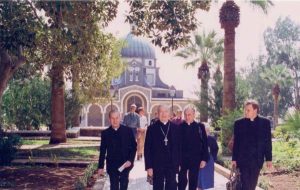
Blessed Alvaro del Portillo in the Holy Land 1994
Del Portillo, now Blessed Álvaro, visited the Holy Places with the devotion of a pilgrim and the responsibility of a Pastor, knowing he was accompanied by the faithful of Opus Dei and thousands of friends worldwide. On the eve of his return to Rome, March 22, he celebrated Mass in the Cenacolino, the place closest to the Cenacle, currently administered by the State of Israel. No one could have suspected it would be his last Mass: he died at his home in Rome in the early hours of March 23.
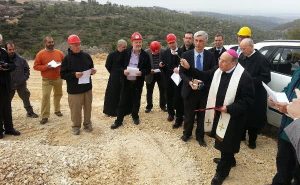
Blessing of the construction with Bishop Javier Echevarría
His successor, Javier Echevarría, who had accompanied him on the pilgrimage, promoted the creation and development of an initiative in the Holy Land to serve visitors and pilgrims from around the world. Unanimously, from the outset, the project was named Saxum—rock—an affectionate nickname Saint Josemaría used to call Álvaro when he was just a young engineering student.
Among my memories of those years, the late 1990s, is the enthusiasm with which a group of friends began raising funds for a project that, at least in my case, I was convinced that it would be others who would see come to fruition.
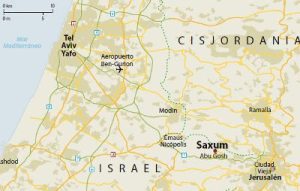
Location map of Saxum in Abu Ghosh
I could not even imagine that one day I would live in Jerusalem and have the opportunity to attend the inauguration of the Saxum Visitor Center in 2019, a multimedia explanatory center of the Holy Land where each civilization seems to completely destroy the previous one. Yet, beyond appearances, everything here speaks of eternity: of an Eternal Covenant, of a Promise of salvation made by God to humanity at the dawn of time, that runs across the History of Humanity like an invisible thread.
Jerusalem—the Holy Land—is a place of encounter; or, seen from another perspective, of searching. It welcomes people from all over the planet who seek God with a sincere heart, or who were not seeking Him but suddenly encounter Him because something stirs them and they need to know, to understand, to discover. Perhaps, even without articulating it, the appeal this Land holds for all who approach it in some way is that each person, from their personal identity of origin, language, religion, tradition, etc., can recognize themselves in it. It is precisely this that gives it a unique cosmopolitan style, in contrast to the great Western cities that suddenly seem overly homogeneous.
Here it is easy to understand that, in reality, it is not man who seeks God; rather, it is God Himself who, with infinite patience, goes out to meet men, every man and every woman, generation after generation.
By Camen Rodríguez Eyre
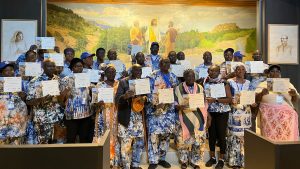
Africa Group at Saxum 2025
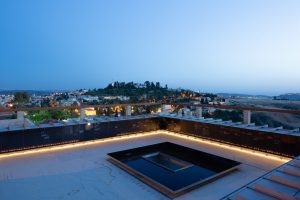
Saxum Visitor Center
